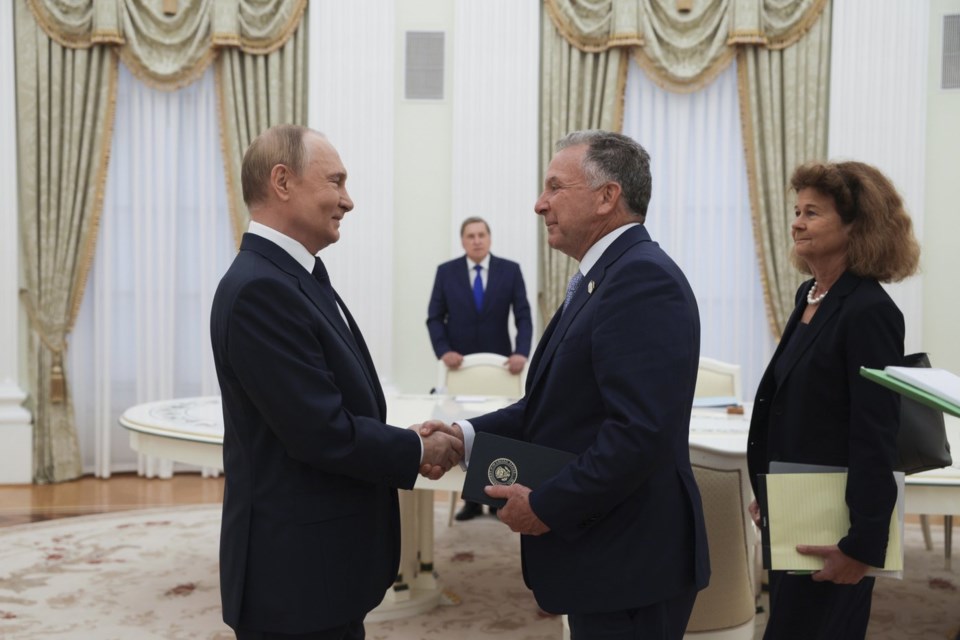Russian President Vladimir Putin held talks with U.S. President Donald Trump’s special envoy Steve Witkoff in Moscow on Wednesday, days before the White House’s deadline for Russia to reach a peace deal with Ukraine or potentially face severe economic penalties that could also hit countries buying its oil.
The meeting between Putin and Witkoff lasted about three hours, the Kremlin said.
Putin’s foreign affairs adviser Yuri Ushakov said that Putin and Witkoff had a “useful and constructive conversation” that focused on the Ukrainian crisis and, in a nod toward improving relations between Washington and Moscow, “prospects for possible development of strategic cooperation between the U.S. and Russia.”
Trump said in a post on his Truth Social media network that Witkoff “had a highly productive meeting” with Putin in which “great progress was made.”
Trump said he updated America’s allies in Europe about the meeting and that they will work toward an end to the Russia-Ukraine war “in the days and weeks to come.”
Earlier on Wednesday, a White House official said the U.S. was still expected to impose secondary sanctions against Russia on Friday after a 10-day deadline Trump imposed is set to expire. The White House has not yet released details about the sanctions. The official was not authorized to speak publicly and spoke on condition of anonymity.
Washington has threatened “severe tariffs” and other economic penalties if the killing doesn’t stop.
Trump has expressed increasing frustration with Putin over Russia’s escalating strikes on civilian areas of Ukraine, intended to erode morale and public appetite for the war. The intensified attacks have occurred even as Trump has urged the Russian leader in recent months to relent.
Ukraine's President Volodymyr Zelenskyy said Wednesday evening that he and Trump spoke on the phone after Witkoff met with Putin in Moscow. He said “European leaders also participated in the conversation,” and “we discussed what was said in Moscow.”
“Our common position with our partners is absolutely clear: The war must end," Zelenskyy said. "We all need lasting and reliable peace. Russia must end the war that it started.” He didn't offer any details of the conversation.
Overnight from Tuesday to Wednesday, Russian forces hit a recreational center in Ukraine’s southern Zaporizhzhia region, killing two people and injuring 12, including two children, regional Gov. Ivan Fedorov said Wednesday.
Russian forces launched at least four strikes on the area and initially attacked with powerful glide bombs.
“There is zero military sense in this strike. Only cruelty to intimidate,” Zelenskyy said in a post on Telegram.
Russia also struck the Ukrainian power grid and facilities for heating and cooking gas, Zelenskyy said, as Ukraine makes preparations for winter.
Western analysts and Ukrainian officials say Putin is stalling for time and avoiding serious negotiations while Russian forces push to capture more Ukraine land. A Russian offensive that started in the spring and is expected to continue through the fall is advancing faster than last year's push but is making only slow and costly gains and has been unable to take any major cities.
The situation on the front line is critical for Ukrainian forces but defenses are not about to collapse, analysts say.
On Tuesday, Trump said “we’ll see what happens” regarding his threat to slap tariffs on nations that buy Russian oil, which could increase import taxes dramatically on China and India.
“We have a meeting with Russia tomorrow,” Trump said. “We’re going to see what happens. We’ll make that determination at that time.”
The president said that he has not publicly committed to a specific tariff rate.
Stepping up diplomatic and economic pressure on the Kremlin risks stoking international tensions amid worsening Russia-U.S. relations.
Putin has given no hint that he might be ready to make concessions. Instead, the Russian leader and senior Kremlin officials have talked up the country’s military strength.
Putin announced last week that Russia’s new hypersonic missile, which he says cannot be intercepted by current NATO air defense systems, has entered service.
Russia announced Tuesday that it no longer regards itself as bound by a self-imposed moratorium on the deployment of nuclear-capable intermediate range missiles, a warning that potentially sets the stage for a new arms race.
Former Russian President Dmitry Medvedev, meantime, warned that the Ukraine war could bring Russia and the U.S. into armed conflict. Trump responded to that by ordering the repositioning of two U.S. nuclear submarines.
Kremlin spokesman Dmitry Peskov on Monday welcomed Witkoff's visit. “We consider (talks with Witkoff) important, substantive and very useful," he said.
Trump initially gave Moscow a 50-day deadline, but later moved up his ultimatum as the Kremlin continued to bomb Ukrainian cities.
However, Trump himself doubted their effectiveness, saying Sunday that Russia has proven to be “pretty good at avoiding sanctions.”
“They’re wily characters,” he said of the Russians.
The Kremlin has insisted that international sanctions imposed since its February 2022 invasion of its neighbor have had a limited impact.
Ukraine maintains the sanctions are taking their toll on Moscow’s war machine and wants Western allies to ramp them up.
___
Associated Press reporter Michelle L. Price in Washington contributed to this report.
___
Follow the AP’s coverage of the war in Ukraine at https://apnews.com/hub/russia-ukraine.
The Associated Press


